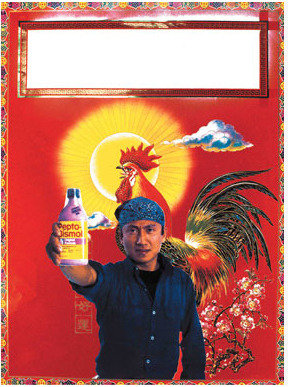Cody Choi
dal 8/5/2015 al 1/8/2015
Segnalato da
8/5/2015
Cody Choi
Kunsthalle Dusseldorf, Dusseldorf
Culture Cuts. Choi's working method is shaped by a civilisational criticism with which he contributes to a dialogue of cultures in such diverse media as painting, sculpture, installation, ink drawings, computer painting and neon texts.

With Culture Cuts Kunsthalle Düsseldorf presents the world's first retrospective devoted to the concept artist Cody Choi (b. 1961, Seoul, South Korea). Choi's working method is shaped by a civilisational criticism with which he contributes to a dialogue of cultures in such diverse media as painting, sculpture, installation, ink drawings, computer painting and neon texts. The exhibition's title references his personal feeling of cultural injuries, cuts and wounds.
Raised in Seoul, his family had to flee from South Korea to the United States in 1983. After briefly studying sociology in Seoul, Cody Choi moved to Los Angeles and began studying art in 1985. He became friends there with his mentor, the artist Mike Kelley, who awoke his interest in post-colonial theories and the differences between cultures. Both artists are linked by the theme of collective fears and desires, derivable for the most part from religious, social or sexual influences. He produced his first body-related sculptures and conceptual pieces at that time which focused on the search for identity in a foreign culture.
Cody Choi lived in New York in the mid-1990s and played a decisive role in the international art scene. He especially became known with the pink "Thinkers" he showed in 1996 at Jeffrey Deitch's gallery and which consist of toilet paper and Pepto-Bismol (an American over-the-counter upset stomach drug). He adapted Western works of art and thus already formulated approaches by Michelangelo, Auguste Rodin, Marcel Duchamp or Gerhard Richter, redefining them in the sense of Appropriation Art.
His dealings with both philosophical as well as aesthetic themes and clichés are always concerned with body-related, sculptural energy storage and metabolism. He broaches the theme of the Conditio humana, the human condition in a heteronomous and superficial surrounding where he subjectively interrelates his lived Oriental background with the fantastical of the American dream. Cody Choi: "In spite of countless cultural exchanges we only know each other but do not understand each other. It is as if we eat food but do not digest it." (1995)
In a data-based metabolic process Choi employed his son's painting program since 1998 in order to generate animal paintings as 3-D computer images as mystic totems, as an unreal continuation of his/a future: that of his son as a real person and that of the digital recreation of worlds, of virtual realities out of pixels. These led him to Gerhard Richter's "abstract paintings" in order to derived further data abstractions from them.
Cody Choi has been living in Seoul again since 2003, where he has a professorship. In a dialogue between image and language as in the ink paintings and neon texts he analyses and ironises new means as regards a questionable capitalist value system. As an "Asian" in the United States and as an "American" back in his ancestral homeland, his works deal with diverse problem fields of cultural socialisation and assimilation. The artist broaches the theme of media-related and culturally produced conflicts between East and West as well as—in his opinion—the relentless westernisation of Asia. The media-oriented socialisation necessitates clichés and misunderstandings that Choi reflects as subjective notions on the diverse value judgements of the system. In the process he stands behind the mirror in the appropriation and rejection of differing realities in the real, symbolic and imaginary network of construction of world. From this perspective he develops questions concerning the identity of human existence in unequal intercultural semantic fields. In the ink paintings and neon texts, for example, he finds his way back in this way to a conceptual art that analyses and ironises new, mostly nihilistic meanings in a dialogue between image and language.
Image: Golden Boy Poster, 1986-1991. Fotodruck 76,2 x 104,1 cm. Courtesy PKM Gallery
Press and Communication
Dirk Schewe Tel.: +49 (0)211 - 89 962 56 Fax: +49 (0)211 - 89 295 76 presse@kunsthalle-duesseldorf.de
Kunsthalle Düsseldorf
Grabbeplatz 4 D-40213 Düsseldorf
Hours: Tuesday–Sunday and public holidays 11–18h



